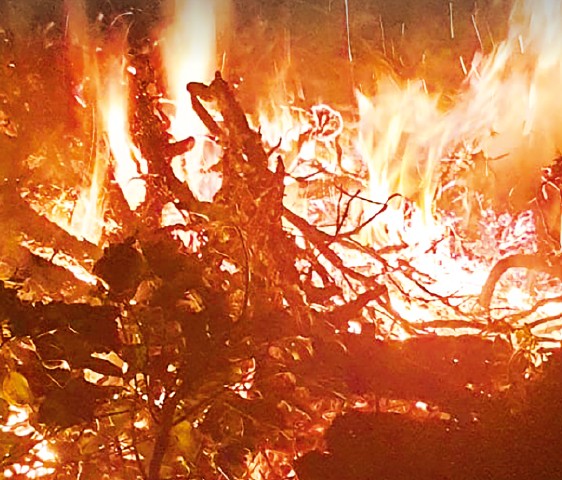God is described in many different ways throughout the Bible. In the New Testament, we read the striking statement that ‘our God is a consuming fire’ (Hebrews 12:29). This phrase alludes to the Old Testament (Deuteronomy 4:24, 9:3) and therefore provides a powerful example of how consistently God’s character is revealed in both parts of the Bible. We’ll consider one episode in which God dramatically demonstrated that He is a consuming fire, and contemplate how this has relevance for worshippers of God today.
Nadab and Abihu
Moses was the man God chose to lead the people of Israel out of their slavery in Egypt. His older brother, Aaron, was chosen by God to be the first “high priest” of Israel. Aaron’s sons also had special priestly duties to perform, and the role of High Priest was to pass down through his descendants. These privileged roles came with blessings, but also with considerable responsibilities. ‘The lips of a priest should guard knowledge, and people should seek instruction from his mouth, for he is the messenger of the Lord of hosts’ (Malachi 2:7). From this, we learn that priests should have been knowledgeable teachers of God’s ways and that the people of Israel should have looked to them for spiritual direction.
Aaron had four sons who served as priests: Nadab, Abihu, Eleazar and Ithamar. The two elder sons were involved in an incredible and intimate experience of the living God:
Then Moses and Aaron, Nadab, and Abihu, and seventy of the elders of Israel went up, and they saw the God of Israel. There was under his feet as it were a pavement of sapphire stone, like the very heaven for clearness. And he did not lay his hand on the chief men of the people of Israel; they beheld God, and ate and drank (Exodus 24:9–11).
What an extraordinary privilege this was! Such a wonderful blessing demanded respect and reverent awe on the part of these two priests.
The book of Leviticus contains details about the sacrificial offerings God commanded His people to make. In chapter 9 we read of the special sacrifice which Aaron made as high priest, in which his sons were also involved.
But in the next chapter Nadab and Abihu took centre stage in the worst possible way. ‘Now Nadab and Abihu, the sons of Aaron, each took his censer and put fire in it and laid incense on it and offered unauthorized fire before the Lord, which he had not commanded them. And fire came out from before the Lord and consumed them, and they died before the Lord. Then Moses said to Aaron, “This is what the Lord has said: ‘Among those who are near me I will be sanctified, and before all the people I will be glorified’” (Leviticus 10:1–3).
God dramatically demonstrated that He is a consuming fire! These two sons of Aaron died because they offered ‘unauthorized fire before the Lord’. From Moses’ comments about this incident, we can infer that Nadab and Abihu did not treat the Lordas holy, nor did they honour Him before the people.
Furthermore, the comment ‘which he had not commanded them’ is significant, particularly when placed against the backdrop of the book of Leviticus as a whole. The phrase ‘the Lord’ and the word ‘commanded’ appear together frequently in the book, almost always in a positive light. For example, ‘Aaron and his sons did all the things that the Lord commanded by Moses’ (Leviticus 8:36). The phrase ‘which he had not commanded them’ therefore stands out as a glaring exception of gross disobedience to God’s commandments.
Then and Now
If we were to act dishonourably, as Nadab and Abihu did, it is highly unlikely that fire from God’s presence would consume us—they lived at a particular time and had a special relationship with God. However, this does not mean that we can’t take any lessons from this incident and apply them to our lives. One of the ways we can do this is by considering the context of the statement ‘Our God is a consuming fire’ with which we began.
Hebrews 12 contains stark warnings about falling away from faithful obedience to God. For example: ‘See that you do not refuse him who is speaking. For if they did not escape when they refused him who warned them on earth, much less will we escape if we reject him who warns from heaven’ (Hebrews 12:25). The section concludes: ‘Let us offer to God acceptable worship, with reverence and awe, for our God is a consuming fire’ (Hebrews 12:28–29).
Immediately before God is described as a consuming fire, there is an exhortation to ‘offer to God acceptable worship, with reverence and awe’. This is particularly interesting when read in the light of Nadab and Abihu’s actions. They offered unacceptable worship, devoid of reverence and awe; this was despite their incredible and intimate experience of the living God.
God is a God of love, mercy and pity, who ‘so loved the world, that he gave his only Son, that whoever believes in him should not perish but have eternal life’ (John 3:16). But we must also remember that He is holy, and when we come to Him we must honour Him. ‘It is a fearful thing to fall into the hands of the living God’ (Hebrews 10:31).
Stephen Blake


